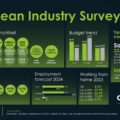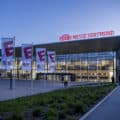Changed market conditions mean that we, as an events industry, have to deal with a new reality.
This is – for the time being – the new reality for clients and the events industry
In conversation with Maarten Schram, founder and director of LiveCom Alliance
In the two years that physical live communication has been put on hold due to the pandemic, the world has changed. We are facing the war in Ukraine, rising inflation and labour shortages. “These changed market conditions mean that we, as an events industry, have to deal with a new reality,” according to LiveCom Alliance founder and director Maarten Schram.
In this article we speak to Maarten to find out what has changed and what adjustments this requires of clients, agencies and suppliers. In this interview, Maarten bases his responses on information from the LiveCom Alliance affiliated industry associations and members of the Dutch branch association IDEA, of which he is director.
What are the most visible consequences for clients of the changed market conditions?
“The price increases are unmistakable. An event that used to cost a certain amount pre-corona is now sometimes up 30 to 40 percent more expensive, according to a study from our German member fwd, conducted by RIFEL Institute. Budgets that were perfectly manageable in 2019 are no longer sufficient. As a result, clients are sometimes faced with the choice of either upping their investment or simplifying their event. And that’s quite a bitter pill to swallow. As it is for agencies too, by the way, because the industry wants nothing more than to work with companies to produce creative, exuberant and impressive live communication to counterbalance the austerity of the past period. With thanks to fwd, we’ve now shared this research with our members, so that they in turn can pass it on to their national members, agencies & companies.”
How can these cost rises be explained?
“We’re dealing with the iron laws of economics: where there is scarcity, there are price rises. And there is currently scarcity in many areas. Due to the war and economic unrest, food, energy and materials have become more expensive. You see that happening everywhere, our industry included. This also applies to the labour shortages. Finding staff is difficult for agencies, caterers, technicians and locations – in fact the entire ecosystem. For example, shortages of people and resources mean that a larger location with eight rooms can only run up to four of those rooms at a time. That causes extra scarcity.”
Is the industry also suffering from the aftermath of the pandemic?
“We see the logical need among clients to want to catch up. In addition, some companies are a bit nervous about planning ahead in view of uncertain corona developments. This leads to peak moments and therefore the natural spread in the market disappears. When a client calls for an event in September, the answer is sometimes: ‘Would love to help you, but it’s no longer possible.’ Especially on popular dates, for example, the location itself is often a deal breaker.
An additional effect is that in pre-production, event managers have to do a lot more work to arrange things. The days of just a few calls are over; your search to get all the necessary components of an event sorted has become much more intensive. It’s unavoidable for agencies to have to factor in those extra efforts.”
In short: a combination of factors
“Absolutely. The war, inflation, labour shortages, the aftermath of corona. It’s a ‘perfect’ storm in which everything comes together.”
How does that affect events professionals?
“Being of service to clients and wanting to fix things is in our DNA. The answer to every question so far has always been: ‘yes’. Even if it was at the very last moment. Sometimes that’s just no longer possible. The will is still there, but there is a risk of overstretching resources. Agencies cherish their people and that means that they have to be careful about the extra demand from the market and the sustainable use of scarce talent.”
Won’t things get back to ‘normal’ when everyone has caught up with the postponed events?
“That depends on how we as a society and, therefore, also as an industry get through this winter, how covid manifests itself. If that remains more in the background, then it’s my belief that within about 6 to 9 months, also depending on what is going on around us in the world, we will be through this normalisation phase.”
How do you view the autumn and the associated sentiment among clients?
“First of all, there are numerous clients who are committed to this autumn and the first quarter of 2023. This is evident from how extremely busy the market is, not just now but also up to and including the first quarter of next year. However, there are also clients who are more cautious about events in that period. Understandable to a certain extent, but not really necessary. Thanks to various research projects, including the pilot events of the Dutch Fieldlab Events, we have been able to use data to demonstrate internationally that we can remain open as a sector in a responsible manner. In fact, follow-up research is currently taking place in the Dutch process, so that we are permanently up to date with our data and continue our dialogue as a sector with the government.”
Where are the solutions in the new reality?
“An important step is to have a grasp of these market conditions, so that we can work together in an understanding and creative way. And that we as a sector cannot change reality and that we use that characteristic DNA to deal with this challenging situation in an inventive way. We convey this to the affiliated industry associations at LiveCom Alliance, so that they too can pass the message on at a national level. But it’s also important that this signal resonates internationally, hence this interview from LiveCom Alliance.
If you want a professional event that matches your business strategy, then it’s crucial to deal with each other efficiently and sustainably. Be on time with your request and think about what it is exactly that you want. If you start too late, everything has to be ‘repaired’ retroactively, so to speak. That just takes extra time – and therefore usually money.
The best thing that clients can do – and fortunately a lot already do so – is to include event marketing in their long-term communication strategy. The sooner you start working with your agency, the sooner event professionals can anticipate and act. As a result, the possibilities grow and you get better results. Especially in a tight and competitive market, that is the path to live, high-impact communication.”
How do you manage that?
“Trust and build on the relationship with your agency. If it isn’t really necessary, avoid having several agencies pitch again for each event, that just puts partners and suppliers to work in a snowball effect, racking up considerable costs in the process. Pitching is very intensive and therefore not sustainable, something that we really should not want in the light of the current market.
Once you’ve selected an agency, build a lasting relationship with them. When you’re in tune with each other, a lot of time and therefore costs can be saved. As you consider potential agencies, don’t let yourself be swayed by fads or flavours of the month. In troubled markets, people can be unpredictable. Especially now, it’s important to keep your cool. The LiveCom Alliance pitch code can be a first step in finding and securing a reliable and long-term partner in live communication.
And if you, as a client, choose to have multiple agencies pitch, then it is no more than reasonable to give those agencies a pitch fee for their work. Especially in these hectic times. In 2018, LiveCom Alliance, together with its affiliated associations, drew up the first pan-European pitch code that may be of assistance. Incidentally, you can also explore your options without pitching. This can be done online, with a phone call or over a cup of coffee.”
Are there also things that can be done more efficiently in the day-to-day collaboration between clients and agencies?
“If a client can work together with the agency early on in the process to consider the goals in detail, this can lead to less twists and turns during the execution. This can in turn save you a lot of time and money as client and get you the most out of your investment. And it makes people at an agency happier, because nobody likes constant overhaul and repair.”
Scarcity often leads to innovation and creative ideas. Do you see those in the industry right now?
“Absolutely. I see that careful thought is being given to which things we do physically live that could potentially be better hybrid or effective online. By addressing that question, you are able to not only make strong choices based on strategy, but also create more space in the physical live component that remains. This is a smart form of dealing more sustainably with available resources, especially when it comes to location and catering. And for the piece that you end up doing physically live, you can pull out all the stops.”
Specifically, what do you advise clients to do in this new reality?
“A number of things:
By anticipating in this way, there are plenty of opportunities for clients to meet their target groups live. And it is up to us as associations to reinforce this message.”

At IMEX the world comes together. So, a great opportunity for – almost our whole – board to meet.


Decision-makers, trade visitors and suppliers to the event industry can expect an interesting mix of exhibitors, superb opportunities for networking and deal- making, and highly informative content live on stage at the next BOE INTERNATIONAL to be held at Messe Dortmund on 17 and 18 January 2024.